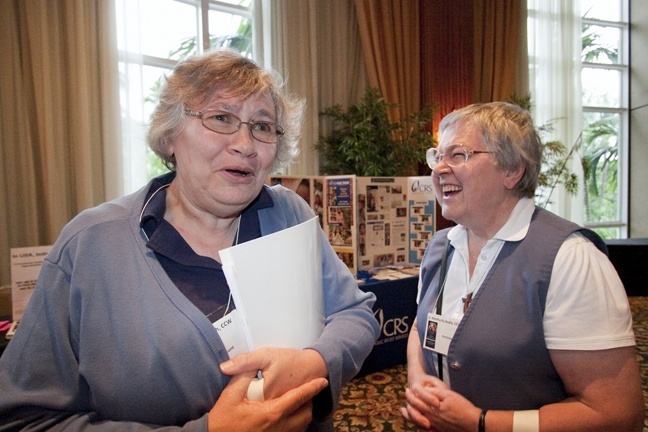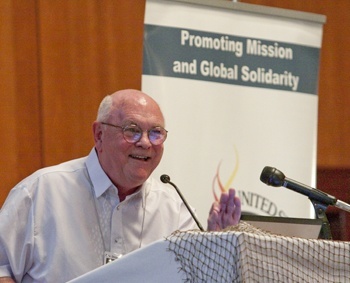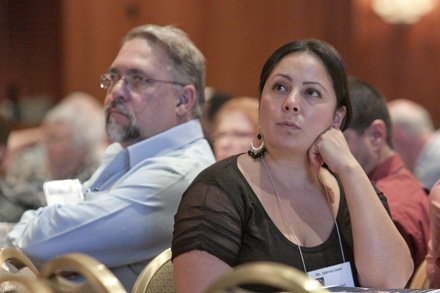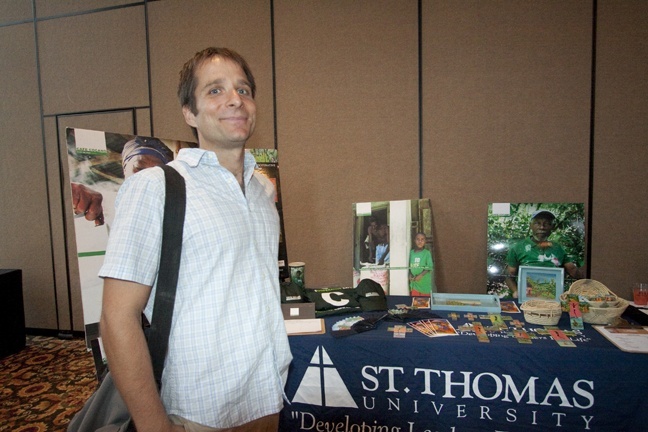By Ana Rodriguez Soto - The Archdiocese of Miami

Photographer: ANA RODRIGUEZ-SOTO | FC
Sister Marilyn Welch, left, major superior of the Carmelite Community of the Word, and her fellow religious, Sister Martha Burbulla, chat during a break in the U.S. Catholic Mission Association conference. Their community has partnered with the Little Sisters of the Incarnation in Haiti.

Photographer: ANA RODRIGUEZ-SOTO | FC
Keynote speaker Father Steve Bevans, a member of the Society of the Divine Word and professor of Mission and Culture at the Catholic Theological Union in Chicago, addresses missionaries during the Miami conference.
�We really consider ourselves sisters, even though we are two separate communities,� Sister Welch said during a break in the Oct. 28-30 conference of the U.S. Catholic Mission Association, held this year in Miami.
Her community�s experience is a perfect reflection of the conference�s theme, �push out into the deep,� and of the fulfillment that results from pursuing any type of missionary work.
�The projects are to kind of keep the Americans busy,� said Sister Welch, whose community makes one mission trip a year to Haiti with lay volunteers. �But in the meantime they�re learning how the sisters live and how the Haitians live.�

Photographer: ANA RODRIGUEZ-SOTO | FC
Lay missionaries Adriano Garcia, left, of Miami-based Amor en Accion, and Sabrina Lopez, listen to Father Steve Bevans' keynote speech.
�It�s been miraculous what has happened,� Sister Welch said. �We come back with more than we can give. It really is a process of transformation.�
A transformation that every Christian is called to experience, according to Father Steve Bevans of the Society of the Divine Word, one of three keynote speakers at the conference, which drew nearly 200 missionaries � both lay, religious and clergy from abroad working in the U.S., and lay, religious and clergy from the U.S. working abroad.
�Discipleship and mission are like two sides of a single coin,� Father Bevans said during the opening talk. �Every disciple is a missionary. It�s not enough to be a disciple. One has to be an active disciple.�
Father Bevans served as a missionary himself in the Philippines and is now professor of mission and culture at the Catholic Theological Union in Chicago. His talk centered on the theological background of mission work, specifically its roots in the Trinity of God.
�God�s deepest self is communion,� Father Bevans said, and that communion is constantly �spilling out� into the universe, through creation itself, through the Spirit and through Jesus, who personified the �kin-dom of God.�
�We are called to preach, serve and witness to the kin-dom of God,� Father Bevans stressed. �We are called to act like God in the world.�
That means mission cannot be an �add-on� to the life of a Christian, but at its very center. While being a Christian is a blessing, �God�s blessings are never for their own sake. They always involve a challenge to mission,� Father Bevans said. �The blessings that we have as Christians are really responsibilities.�
That is the challenging part of missionary work � going beyond one�s comfort zone in dealing with people of different languages, cultures and traditions � and at the same time acknowledging, as Archbishop Thomas Wenski said in his Oct. 29 homily to the missionaries, that they are only �guests� in someone else�s house and therefore have no right to figuratively help themselves to the food in the refrigerator or rearrange the living room furniture.
But Father Bevans assured his audience that those who take on that challenge, that discomfort of mission, �will be amply blessed.�
The Mass celebrated by Archbishop Wenski at Notre Dame d�Haiti Church in the heart of Miami�s Little Haiti district, and the multicultural celebration that followed, were among the highlights of this year�s mission conference.
The association also gave its Mission Award 2011 to the Miami-based group Amor en Accion, �in recognition for their commitment to mission and global solidarity.�
Amor en Accion�s director, Teresita Gonzalez, has just been named director of the Archdiocese of Miami�s Mission Office, and also serves as president of the executive committee of the U.S. Catholic Mission Association.
This year marks the group�s 30th anniversary, so this conference �is really pretty special,� said Father Michael Montoya, executive director of the group.
Father Montoya is a native of the Philippines and a member of the Missionaries of Jesus who was sent as a missionary to the U.S. He said mission work is a two-way street in the U.S. right now, as this country is �both sending and receiving� missionaries. Among the association�s members are missionaries from Bangladesh, India, Haiti, Latin America and the Philippines.
The goal of the conference is �to gather all the missionaries and those whose hearts are in mission to deepen their mission perspectives, to network with each other, and also to inspire one another,� Father Montoya said.
The other keynote speakers at the conference were Sister Madge Karecki, of the Sisters of St. Joseph-Third Order of St. Francis, who directs the Office for Mission Education and Animation for the Archdiocese of Chicago, and Miguel Diaz, a Miami-raised theologian who serves as U.S. Ambassador to the Holy See. (See accompanying story)
Aside from the keynote talks, the mission conference featured plenty of time for what the association calls �home communities� and dialogue sessions � rather than workshops � because, as Father Montoya explained, �People need time to share what touches them and not just be passive listeners.�

Photographer: ANA RODRIGUEZ-SOTO | FC
Anthony Vinciguerra, coordinator of St. Thomas University's Center for Justice and Peace, poses in front of his display at the mission conference. Through its Global Solidarity Partnership, St. Thomas is helping a cooperative of coffee farmers and artisans in the Diocese of Port-de-Paix, Miami's sisters diocese in Haiti, as well as putting solar panels on the cathedral.

